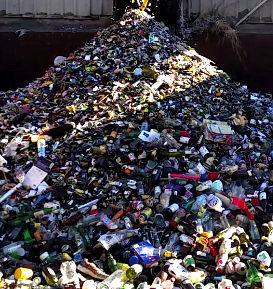Waste plan plugs local industry
 The waste industry has put forth a national strategy to deal with stockpiles of recyclable materials.
The waste industry has put forth a national strategy to deal with stockpiles of recyclable materials.
China has banned the import of 24 types of foreign solid waste and recyclable material.
It is concerning for Australian state and local governments, which export over 600,000 tonnes of waste per year.
The Municipal Association of Victoria has warned that the ban will create “significant cost implications [are] likely for all councils and ratepayers”.
The group has predicted rate rises of up to 2.5 per cent.
The Victorian Government put up $13 million fund to help local councils manage the added cost of kerbside collection, but this money will run out at the end of June.
The Australian Council of Recycling (ACOR) and the Waste Management Association of Australia (WMAA) have produced a $150 million plan to ‘re-boot’ the local recycling industry.
The proposal says the manufacturing infrastructure should be boosted to process recyclable waste domestically.
“It is time to transform the recycling and resource recovery industry so it can help transform our economy to a more competitive, sustainable, and circular model that makes the best use of as many resources, including human resources, as possible in Australia,” ACOR chief executive Peter Shmigel said.
“A $150 million National Action Plan would enable the 'three I's' that are needed to re-boot recycling and kick-start the circular economy.
“Investment in infrastructure and new markets, improvement of recyclate material quality and recycling contracts, and innovation in positive purchasing of recycled content products by governments.”
WMAA chief Gayle Sloan said the shift in China should be used to create significant economic opportunities.
“What we export is actually commodities not waste [and] what we're actually doing is trading on a global market with others who manufacture that waste,” Ms Sloan said.
“We actually shouldn't be exporting those commodities, we should be creating that manufacturing base in Australia and creating jobs.
“[We're] looking at resetting Australia to a circular economy, setting the right policy frameworks, investment and planning criteria to help us develop those secondary markets in Australia.”
Ms Sloan said a national approach is needed.
“It's time; Australia has been talking about going circular and taking action since 2009 with the federal environment plan,” she said.
“We're all at different places but what we're actually calling on is everyone to come together and agree this is the roadmap and this is how we go forward.”
The Federal Government says the matter will be discussed at an upcoming meeting of Environment Ministers on April 27.







 Print
Print